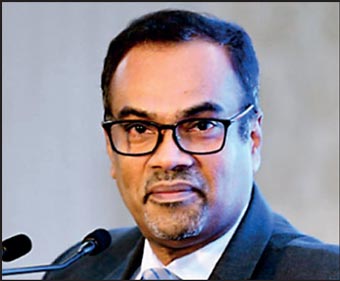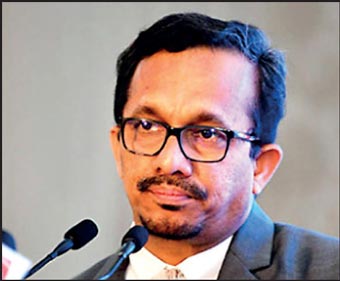Sunday Feb 22, 2026
Sunday Feb 22, 2026
Friday, 17 October 2025 00:00 - - {{hitsCtrl.values.hits}}

 |
| Labour Minister and Economic Development Deputy Minister Dr. Anil Jayantha Fernando |
 |
| Industry and Entrepreneurship Development Minister Sunil Handunneththi |
Labour Minister and Economic Development Deputy Minister Dr. Anil Jayantha Fernando yesterday declared that Sri Lanka is setting sail towards a bold new future in ocean-based industries, aiming to position itself as the premier destination for Blue Economy investment in South Asia.
Delivering the keynote address at Marine Summit: Voyage Sri Lanka 2025, organised for the second consecutive year by the Export Development Board (EDB), Dr. Fernando outlined the Government’s Blue Economy Vision 2030, a strategic framework to unlock the vast potential of the country’s marine resources, identifying five key sectors, including sustainable fisheries and aquaculture, marine biotechnology and pharmaceuticals, port development and maritime logistics, marine tourism and recreation, and offshore and energy services, as priority areas for investment.
The summit, which brought together global experts, investors, policymakers, and industry leaders, served as a vital platform to showcase Sri Lanka’s marine potential and attract strategic investments.
“The oceans surrounding us are not just a natural resource; they are the foundation of our future prosperity,” Dr. Fernando said.
He noted that the Government’s long-term commitment involves both policy reform and institutional strengthening to support private sector innovation and international partnerships.
“Our vision is clear to develop a resilient, competitive, and sustainable marine economy that generates employment, investment, and global partnerships,” the Minister noted.
As per the identified five key areas, Dr. Fernando highlighted sustainable fisheries and aquaculture, with emphasis on modernising fishing fleets, improving cold chain logistics, and introducing value-added seafood processing for export. The second is marine biotechnology and pharmaceuticals, leveraging Sri Lanka’s rich biodiversity to develop bio-based products and medical research ventures.
He also highlighted port development and maritime logistics as critical growth enablers. “With the expansion of the Colombo Port and the development of the Hambantota and Trincomalee harbours, Sri Lanka is poised to become a regional hub for cargo handling, ship repair, and bunkering services,” he added.
Marine tourism and recreation was identified as another priority, with plans to integrate coastal and ocean-based experiences such as sailing, diving, and eco-tourism into the broader tourism strategy. Additionally, marine and offshore services, including oil and gas exploration and energy hub development, were cited as emerging opportunities for international investors.
The Minister detailed the policy reforms the Government has undertaken to support the growth of the Blue Economy. These include tax incentives for investors and regulatory streamlining and infrastructure investments in ports, fisheries harbours, and coastal zones. “We are working closely with the Board of Investment (BOI) and the EDB to ensure a seamless investor experience, from project approval to implementation,” he said.
The Government has also prioritised environmental governance, ensuring that all marine and coastal projects comply with sustainability standards in line with the UN’s Sustainable Development Goal (SDG) 14, “Life Below Water.”
Underscoring Sri Lanka’s competitive advantages, Dr. Fernando noted the country’s strategic location at the centre of major global shipping lanes, connecting East and West. “We sit at the crossroads of the Indian Ocean, a trillion-dollar trade corridor. This gives Sri Lanka unparalleled potential to serve as a logistics, repair, and service hub,” he emphasised.
He further pointed to the availability of a skilled maritime workforce, the existence of world-class port infrastructure, and the island’s vast exclusive economic zone (EEZ), which spans more than seven times its land area. “Our human capital and geography together make Sri Lanka an ideal destination for global investors in the marine sector,” he said.
The Minister extended a call to action to international partners to join Sri Lanka in building a sustainable and profitable Blue Economy. “We invite investors, development agencies, and maritime nations to collaborate with us in transforming Sri Lanka into a true maritime nation,” he said.
He added that with policy stability, Government backing, and institutional facilitation, Sri Lanka offers a conducive environment for investors seeking long-term growth in ocean-based industries. “The ocean connects us all. Together, we can turn Sri Lanka’s blue potential into shared prosperity for the region,” he affirmed.
The conference brought together an impressive line-up of national policymakers, development partners, and international industry leaders, including Industry and Entrepreneurship Development Minister Sunil Handunneththi, Ports and Civil Aviation Minister Anura Karunatilaka, Industry and Entrepreneurship Development Deputy Minister Chathuranga Abeysinghe, Western Province Governor Hanif Yusoof, EDB Chairman Mangala Wijesinghe, and BOI Chairman Arjuna Herath.
Minister Handunneththi, addressing the forum, stressed that Sri Lanka’s strategic geographic position provides a natural advantage for maritime trade and logistics.
He highlighted that infrastructure modernisation and new policy frameworks were being prioritised to enhance global competitiveness in the marine and offshore services sector. Inviting international investors, he assured that the Government would provide all necessary facilities and support to accelerate sectoral growth.
Adding a global perspective, Asian Development Bank (ADB) Country Director Takafumi Kadono discussed the ADB’s strategic partnership in Sri Lanka’s Blue Economy transformation, sharing lessons from regional cooperation models and outlining future investment opportunities.
The conference featured participation from international organisations such as the ADB, International Maritime Organisation (IMO), and United Nations Development Programme (UNDP), alongside academic experts from the University of Moratuwa and University of Ruhuna, as well as industry representatives from the Sri Lanka Ports Authority, Colombo Dockyard, Marine Industry Council, and GAC Group Sri Lanka.
Wijesinghe reaffirmed the Board’s commitment to fostering a globally competitive marine and offshore services sector through innovation, human capital development, and international partnerships, positioning Sri Lanka as an emerging Blue Economy hub in the Indian Ocean.